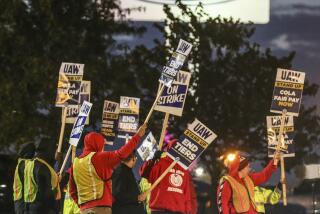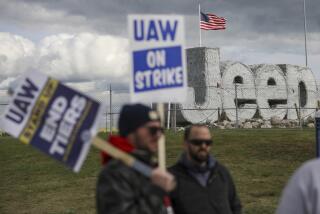Bracing for Life After Firestone
- Share via
DECATUR, Ill. — This has all the makings of a woe-is-us story. Bridgestone/Firestone Inc. plans to close its mammoth tire factory here by the end of the year, throwing 1,500 workers out of jobs. They’re good jobs too, among the most coveted in town, with some paying $20 an hour or more and guaranteeing up to six weeks’ vacation. Losing them will be tough.
Indeed, the mood at the Sundown Lounge was pinched one recent evening as Firestone workers sipped Busch or Bud in stinging clouds of cigarette smoke. Doug Chandler, for one, wondered what he’ll do when he loses the only job he’s ever had--other than mowing the cemetery lawn as a kid. “I’m only 47 years old,” Chandler said. “I’m going to have to find work. But I don’t know anything other than Firestone.”
There are plenty of workers who could echo those words. But civic leaders refuse to be dragged into despair.
Although they’re quick to voice sympathy for those facing layoffs, they cast the Firestone decision as an opportunity for Decatur, not a disaster.
This city of 83,000, midway between St. Louis and Chicago, long has been the quintessential factory town--smokestacks and unions and lunch pails and all. (The Chicago Bears football franchise was founded here in 1919 as the Decatur Staleys, a team made up entirely of factory workers.) In addition to building tires, they fabricate steel here and assemble mining machines, make car windshields and process corn. Even when Firestone pulls out, half-a-dozen major manufacturing plants will remain to anchor Decatur’s economy.
Yet city leaders are eager to change the grubby image that “factory town” conjures. The Firestone closure offers a chance to do just that. The city wants to nudge the laid-off workers into community college programs to learn such skills as nursing, accounting and engineering. It wants to prove there’s life beyond the assembly line.
“A lot of people have the mind set that this is going to be a blue-collar factory town going to pot,” City Manager Steve Garman said. “But it is not a doom-and-gloom situation.”
Added Mayor Terry Howley, his smile slightly strained, “We have to view it that way.”
In truth, Decatur--like factory towns across the country--has been trying to shift gears for two decades. Low-skill, high-pay assembly jobs have been vanishing for years, eliminated by computerization or moved overseas to save money. Caterpillar Inc., for instance, used to employ 5,600 workers to build its earthmoving machines in Decatur. Now it employs 2,200. And many of those positions are reserved for engineers and industrial designers.
“The face of manufacturing is changing,” said Chuck Novak, president of Richland Community College here. “Companies need computer technicians instead of assembly-line workers.”
Also in hot demand: health care workers. Decatur Memorial Hospital has added 198 full-time jobs in the last year, “and we would hire another 60 to 80 people today if we could find the right ones,” said Chief Executive Kenneth Smithmier. The hospital is so desperate that it pays for recruits to attend nursing school and gives them part-time jobs while they study. Smithmier hopes many tire workers take advantage of the offer.
“Any transition is painful, and you always see the pain of what you lost before the advantage of what you’ll gain,” he said. “But we want to say to the community that there is life after the factory.”
That upbeat message is a hard sell in the well-worn union hall of United Steelworkers of America, Local 713.
Civic leaders can talk all they want about college training and white-collar jobs and moving Decatur beyond factories. The reality here is this: Men and women with mortgages and car payments and babies are looking at losing their jobs by December. And while there are plenty of open posts they could apply for--prison guard, nursing assistant, truck driver, barber--none pays anywhere near the salary they made at Firestone.
“I’m working two jobs and I’m not earning half of what I earned there. I’m getting ready to declare bankruptcy,” said Cynthia Fleming, 25, who was laid off during Firestone’s round of cuts last fall.
Added Dennis Whitehead, an electrician who has spent 16 years at the plant: “The mood is a little somber around here.”
It is more than a little combative, as well.
Many workers assert that their plant is being made a scapegoat for the hit Firestone took last summer when its tires were blamed for a series of deadly Ford Explorer accidents. The company recalled 6.5 million tires--and fingered the Decatur plant as the source of many of the faulty ones. Firestone executives insist the plant closure has nothing to do with the recall. Workers here don’t believe them.
“They blamed everything on Decatur, Ill. It’s like we’re the cancer and we have to be cut out to save their name,” Chandler fumed.
Union President Roger Gates agreed. And he refuses to roll over. He is still fighting to save the plant, although Firestone says its decision is final. “I’m not going to give up,” Gates vowed.
Only 550 of the 1,500 union workers about to lose their jobs are eligible for early retirement. Those lucky ones will get pensions and lifetime medical benefits. The rest will need good jobs, and fast. In Decatur, a good job has always meant a union job, a factory job. Gates thinks that’s how it always ought to be.
It may not be the official spin. But Gates says it anyway, proudly defiant: “Decatur will be a manufacturing town for a long time.”
More to Read
Inside the business of entertainment
The Wide Shot brings you news, analysis and insights on everything from streaming wars to production — and what it all means for the future.
You may occasionally receive promotional content from the Los Angeles Times.







